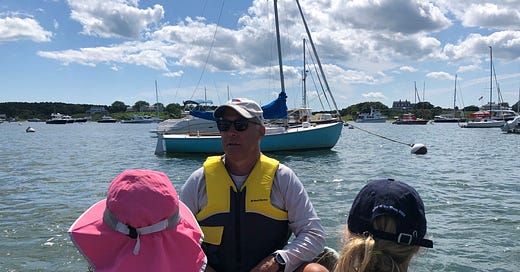Have you ever tried to row a boat? It appears easy, but not until you handle the oars will you realize it is a skill. Have you ever tried to row a boat with your family sandwiched in an eight foot rowing dinghy?
On a beautiful summer day, I invited my childhood friend and his ten-year-old twin daughters out for a sail. They don’t fall into the neurodiverse category. This was a fun sail to help my friend build confidence sailing with his daughters. Sadly, most don’t associate fun with learning. Fun is an essential ingredient in learning!
To get to the sailboat, I rowed the father and daughters to the mooring. After we finished our sail, I offered to let his daughters row the boat back to shore. I suggested each daughter take one oar, and sit side by side.
They quickly learned they would have to adapt. Their way would not work. One girl was stronger while the other girl was struggling to keep the oar in the oar lock. The boat was going in circles.
Neither girl fully agreed on how to row the boat. Both had the same goal to row the boat back to the beach. We were at a crossroads.
My role as a facilitator is not to interfere. If I am asked a question, I do my best to answer. Many teachers struggle shifting their roles from “director” to “observer.” It is in observing that everyone has a chance to grow.
The Director may get the most credit in a blockbuster movie. But when the movie is over, no one remembers the Director. The participants remember their experience and how they felt.
As the girls continued to work in opposition, a shift in energy occurred. The father stepped in. He asked if he could take the oars with his daughters while they were still holding on, so all three could row together and feel the boat in unison.
He let go and let them try. They made a couple strokes in synchronicity and then returned to their old pattern of opposition.
This is such an excellent learning opportunity! No one learns instantly. We learn, fail, learn some more, fail, and eventually master a skill. If we learned instantly, there would be no reward. There would be no value.
Fred Rogers aka Mr. Rogers is considered a saint. Most do not realize he was controversial for most of his career. Many thought his kindness was all an act. Fred failed often. His real legacy is that he used his failures to improve.
“The most important learning is the ability to accept and expect mistakes, and deal with the disappointments that they bring.” Fred Rogers
Families are not necessarily designed to row a boat. The families in our heads can sometimes be rowing partners and other times they feel like they are going to sink the boat and kill us. Neither are true. It is mostly old stories we like to relive.
Rowing a boat solo, you can go fast. Rowing a boat with others, you can go far. Rowing a boat with your family, you can learn love.
Take an oar, dip it in the water and go fail some more!
If you want a facilitator to help you with the process, send me an email at cam@camronadibi.com





"The water is wide." Can we (humanity) learn to pull together? There really isn't a choice.
Rowing's a great "Modality". I prefer Dories, with our son.